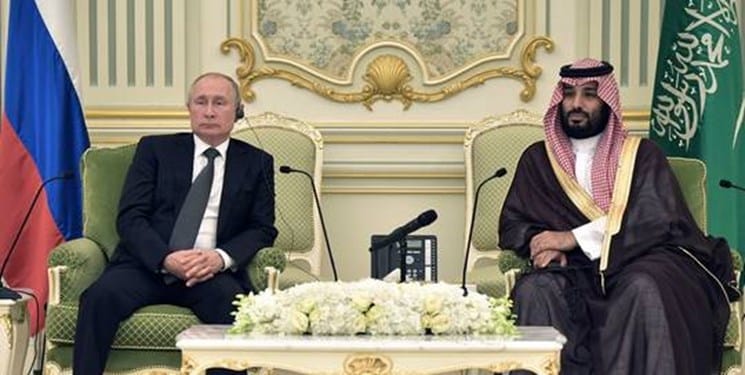Reuters: Saudi Arabia has demanded American restraint with Ansarullah.
Saudi Arabia has demanded that the United States show restraint in any possible response to Yemen’s Houthi (Ansarullah) actions against ships in the Red Sea.
An English media, quoting two well-informed sources, claimed on Wednesday that Saudi Arabia has demanded that the United States show restraint in any possible response to the actions of Yemen’s Houthis (Ansarullah) against ships in the Red Sea.
Reuters news agency reported this claim, quoting unnamed sources, and wrote that Riyadh seeks to prevent the spread of conflicts between Hamas and Israel to other parts of the region.
Yemen’s Ansarullah movement has carried out several military operations against Israeli ships in the Red Sea and the Makran Sea in support of the Palestinian resistance since Israel’s attacks on Gaza.
“Mohammed Al-Bakhiti, a member of the political office of the Ansarullah Amru movement, said that the military operations of the Yemeni National Army forces are only against Israeli ships and will continue until the end of the aggression against Gaza.
He said: “Our military operations in the Red Sea and the Makran Sea only target Israeli ships. “Our military operations against the occupying regime will continue and expand until the crimes of this regime against the Palestinians are stopped.”
Two sources familiar with Riyadh’s thinking have said that in a situation where the Yemenis have increased attacks on ships in the past two weeks, the purpose of Riyadh’s message to Washington is to show restraint to prevent further escalation of tensions.
These sources, who asked not to be named, added that Saudi Arabia is satisfied with the procedure that the United States has taken so far.
“They pressed the Americans on this issue and why the conflict in Gaza should stop,” said one of the sources.
The White House did not respond to Reuters’ request for comment. Saudi Arabia has also left the email sent by this news agency unanswered.
Saudi Arabia has hailed a cease-fire in Gaza to end what it has described as a “brutal war,” and its diplomacy reflects Riyadh’s broader policy of bolstering regional stability after years of confrontation with Iran and its allies. Is.
Saudi Arabia normalized its relations with Tehran this year and is trying to get out of the war with the Yemeni army that has lasted for nearly 9 years. Since April 2014, the coalition led by Saudi Arabia targeted the poor country of Yemen with heavy air, land, and sea attacks to restore power to Abd Rabbo Mansour Hadi, the resigned president of Yemen.
These attacks have led to the destruction of Yemen’s infrastructure and the spread of poverty, unemployment, and infectious diseases in this poor Arab country. Since the beginning of these attacks, tens of thousands of Yemeni civilians have been martyred and injured.
Sources cited by Reuters said that Saudi Arabia is trying to advance the process of ending the war in Yemen while the region is involved in the Gaza war, and is worried that the Gaza war may derail these efforts. Yemen is experiencing relative peace due to the direct peace negotiations between Saudi officials and Ansarullah.
The Yemeni Houthis, with tens of thousands of fighters and a huge arsenal of ballistic missiles, have now become an important military force in the Arabian Peninsula, according to Reuters.
Reuters, citing sources it described as “senior sources” in the Ansarullah group, wrote that the group’s attacks in the Red Sea are part of efforts to put pressure on Washington to end the attacks in Gaza. This is a goal that, in addition to Ansarullah, Iran, Saudi Arabia, and other countries in the region are pursuing.
The latest statistics from Gaza indicate that more than 16,200 people have been martyred in the heavy attacks of the Israeli regime after the Al-Aqsa storm operation on October 7. Tens of thousands of people have been injured in these attacks.
Yesterday, the government information office in Gaza also reported that since the beginning of the war against Gaza, the Zionist regime has destroyed 121 government headquarters and disabled 69 schools.
One of the sources cited by Reuters claimed that representatives of the Ansarullah group discussed their attacks with Iranian officials in a meeting in November in Tehran and said that they intend to carry out “controlled actions” to end the Gaza war.
Another alleged source from Reuters also said that the Islamic Republic of Iran does not want a full-scale war in the region, which may drag this country into war.
The authorities of the Islamic Republic of Iran have previously denied involvement in these attacks. Nasser Kanani, the spokesman of Iran’s Foreign Ministry, rejected for the umpteenth time the attempts of Western authorities to connect the attacks of the resistance group to Iran.
White House National Security Adviser “Jake Sullivan” linked the targeting of two ships belonging to the Zionist regime by Yemen’s Ansarullah to Iran and said, “We believe that Iran is ultimately responsible.” He also stated that the United States is consulting with its allies to find an appropriate response to Yemen’s attacks against Zionist ships.
In response to Sullivan’s accusations, the spokesperson of the Ministry of Foreign Affairs said: “The US government, by continuing to unconditionally support the Israeli apartheid regime and continuously and widely sending bombs and deadly weapons to this regime, is the main responsible for the ongoing war crimes of the regime in Gaza and the West Bank against The Palestinians are ultimately responsible for the tension in the region.
This senior Iranian diplomat emphasized once again that the Islamic Republic of Iran does not have a representative force in the region and the resistance groups in the countries of the region act completely independently and according to their discretion and decision about the security of their countries or to support the oppressed Palestinian nation.

